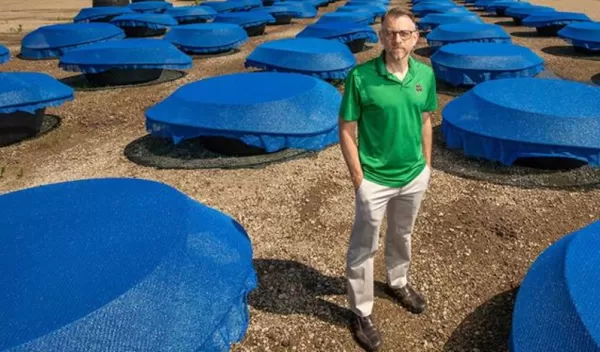
Eliminating public health scourge can also benefit agriculture
Schistosomiasis, a parasitic disease that causes organ damage and death, affected more than 250 million people worldwide in 2021, according to the World Health Organization.
One of the world's most burdensome neglected tropical diseases, schistosomiasis occurs when worms are transmitted from freshwater snails to humans. The snails thrive in water with plants and algae that proliferate in areas of agricultural runoff containing fertilizer. People become infected during routine activities in infested water.
"This study is an example of how basic research on the causes of infectious diseases can have not just direct applied benefits, but also improve lives in many other ways"
- Sam Scheiner
U.S. National Science Foundation-supported researchers at the University of Notre Dame, in a study recently published in Nature, found that removing invasive vegetation at water access points in and around several Senegalese villages reduced rates of schistosomiasis by almost a third. As a bonus, the removed vegetation can also be used for compost and livestock feed.
"Disease, food, energy, water, sustainability and poverty challenges intersect in many ways, but are typically addressed independently," said lead author Jason Rohr. "We sought to break down these silos and identify win-win solutions, while demonstrating their cost effectiveness so that residents would hopefully adopt them widely."
Rohr and his team spent seven years on the project, with research conducted in 23 villages and clinical trials in 16. They found that villages with substantial fertilizer use had more submerged vegetation. These villages had more snails and a higher prevalence of schistosomiasis infection in children, said Rohr.
Researchers hypothesized that removing vegetation could reduce infections while providing greater access to the open water that is crucial for daily activities and recreation. So, they conducted a three-year randomized controlled trial in 16 communities, where children were treated for their infections and the researchers removed more than 400 metric tons of vegetation in water access points from half the villages. These removals resulted in a decline in snail abundance as well as schistosomiasis infection rates being nearly a third lower than those observed in control villages.
"This study is an example of how basic research on the causes of infectious diseases can have not just direct applied benefits, but also improve lives in many other ways," says Sam Scheiner, a program director in NSF's Division of Environmental Biology.
